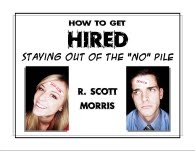Q: For interviews and cover letters, I've heard that the best way to show interest in a firm is to give historical facts (founding date, important deals) or logistics (number of employees). How often should we work these in?
Yikes, what bad advice. That is the last thing I want to hear. When I am reading your cover letter, I do want to know that your letter has been written specifically to answer my job description, and that it is not a form letter. Likewise, when I am assessing you in both your cover letter (and resume) and during your interview, I am looking for evidence that you would want to work for me and my firm.
But, regurgitated facts are not the way to show it.
Experiences and skills that are aligned with what I do are much more relevant to me. I am never going to leave an interview thinking, “Wow, she was able to name all three of our founders and knew when their birthdays were!” But you will be heading towards an offer if I am thinking “Wow, that research project she worked on covered exactly the type of problems we deal with every day!”
Dazzle me with your skills and evidence of interest in my industry; don’t bore me with memorized facts about my firm.
Are you wondering How to Get Hired? Join the discussion on my Facebook Group Polished and ask me anything you have ever wondered about resumes, cover letters, interviews, and job hunting!
Q: If an interviewer asks if I have applied to other companies, including competitors, should I be frank?
Yes, it is okay to tell them that you are interviewing with their competitors. This will actually give them some level of comfort, since it shows that you are focused on their particular industry.
But, don’t elaborate on the point; this is a common mistake. Keep it short and sweet. Since this is a general question, you only have to give a general response. Specifically, don’t go into detail about your other opportunities, their relative fit, and your assessment of them.
If someone asks you this level of detail—which they may near the offer stage of the process—keep it positive. Never “diss” another company – even to a perceived rival. This would be viewed as unprofessional.
Are you wondering How to Get Hired? Join the discussion on my Facebook Group Polished and ask me anything you have ever wondered about resumes, cover letters, interviews, and job hunting!
Q: Should I make a new resume for each company I apply to? How different should each cover letter be?
It is perfectly fine to customize your resume and cover letter for each opportunity. Your goal when doing this will be to highlight your particular skills and strengths as they relate to the individual opportunity. For example, if giving presentations will be a key part of the job, make sure your presenting experience and skills stand out over less related information.
Just be aware of the logistical problem of remembering which version went to whom.
With regard to cover letters, once you have done four or five of them, you usually have covered most iterations and can cut and paste the right pieces together. Keeping your information general, but tayloring it to each particular opportunity, is the best combination.
Are you wondering How to Get Hired? Join the discussion on my Facebook Group Polished and ask me anything you have ever wondered about resumes, cover letters, interviews, and job hunting!
Q: I keep being told that good interview skills are equivalent to good social skills. Isn't preparation basically for people who cannot carry on a normal conversation? I mean, we are just giving a few soundbites and talking about ourselves, right?
Well, I guess that would be equivalent to convincing yourself that you don't need to study for finals, because you "know the material". If you ever talked yourself into this frame of mind, you know how well it turned out. Expect the same level of success if you do not adequately prepare for your interviews.
Interviews are not a normal form of interaction. They are one of the most uncomfortable, nerve-wracking experiences you will ever endure. When caught off-guard with a question one is not prepared to answer, a common response is panic and a spewing of blabber from one's mouth. No social skills or any other innate ability will help you after this, but the confidence of being well-prepared will save you.
Be aware that you have very little time during an interview to present your case for why you should get the job. You have to be ready to articulate your top selling point under all the possible scenarios your interviewer may throw at you. You have to practice answering many iterations of possible questions and be able to deliver your message in a fluid--but not over-rehearsed--way.
Like everything else in life, you get better with practice. Interviewing is no different.
Are you wondering How to Get Hired? Join the discussion on my Facebook Group Polished and ask me anything you have ever wondered about resumes, cover letters, interviews, and job hunting!












